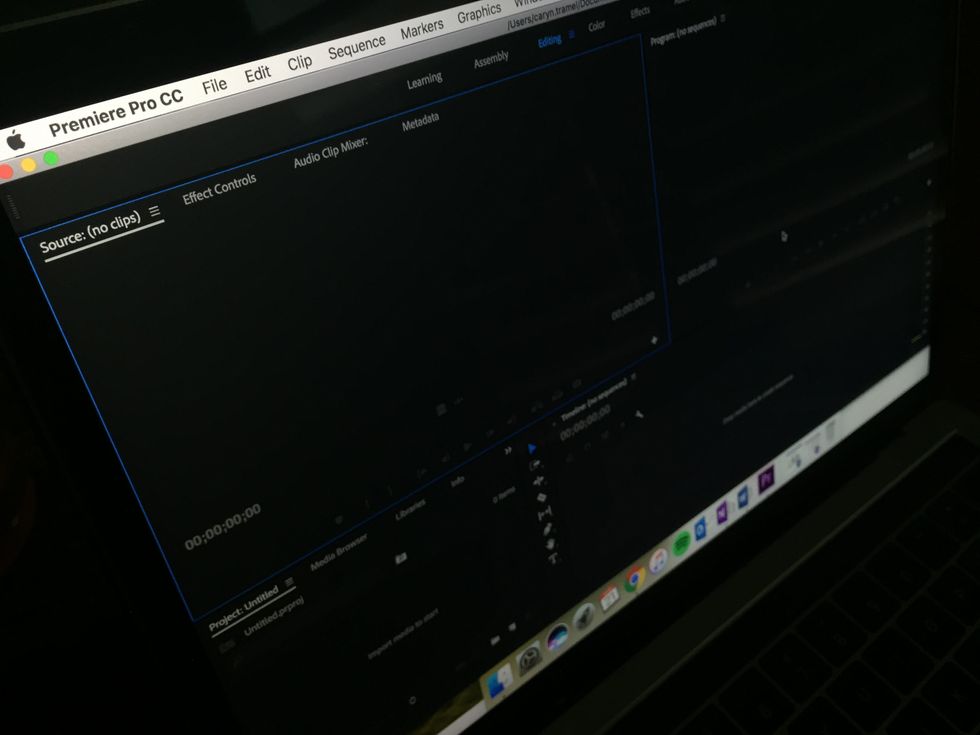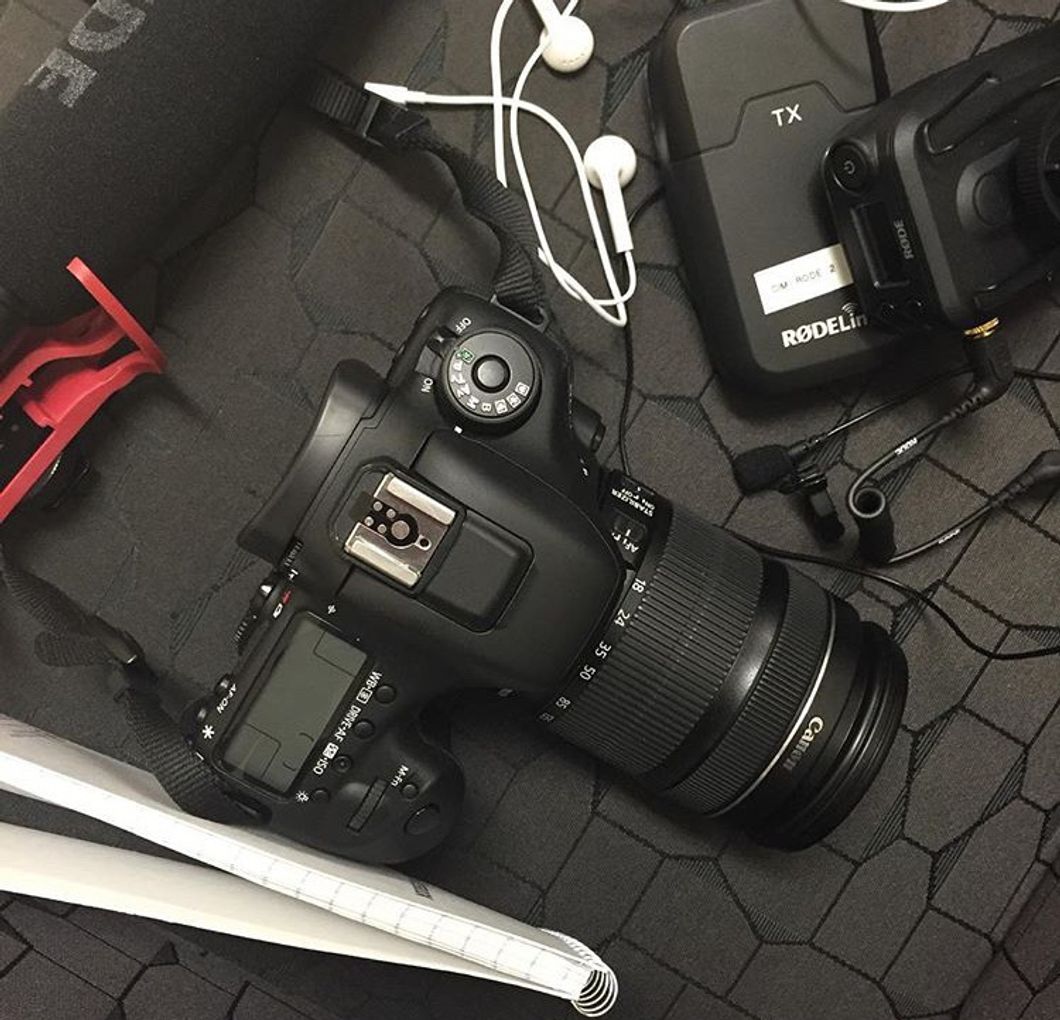Classes started this week and some of you incoming students may be a little nervous about this semester. Don't worry. College isn't that scary, especially when you talk to other students in the same major. So I'm here to help you out with tips that I learned throughout my first year.
1. Don’t buy textbooks.

Photo by Camila Damásio on Unsplash
Rent your textbooks from Textbook Brokers. They have two locations really close to campus. They also have a payment plan, so if you haven't received your financial aid, you can still get your books before class starts. If you get to class and find out you don't need the book, you can return the book before a certain date and get a full refund. At the end of the semester, you can buy the book if you really want to keep it.
I highly recommend this because there are a lot of books in Film and Video that are outdated or redundant. You don't want to be trying to sell textbooks later on that nobody needs or wants. However, there are some books that I'm keeping because they have great charts and pictures for future reference.
(This does not apply for science lab classes. You will need to buy a new copy of the lab book for each science class that has a lab.)
Textbook Brokers FAQ
2. Buy a hard drive.

Photo by Caryn Tramel
You will use a hard drive for all your film classes. I personally have mine in my backpack all the time, even if I don't have a film class on that day. You never know when you'll need to put footage on it or pull up a project for someone to see. My hard drive was the biggest asset during my summer classes. It allowed me to format my SD cards after shooting and share the multiple edits of the videos with my project group. Also, it is required for the Post Production class. I recommend formatting the hard drive for both Macs and PCs.
In addition, organize the media on your drive. There are several different ways to do this. Find something that works for you. I personally organize my drive by class, then project, and then medium type.
3. If you don't have equipment, don't panic.

Photo by Peter McKinnon on Instagram
In early classes, you don't need all the fancy equipment to make good projects. If you want to branch out, the Bragg has an equipment checkout. Now you do need professor permission to check out equipment, so I don't know about using equipment for personal projects. Also, there are some equipment restrictions for the lower level classes.
But other than that, the Bragg has you covered. There are cool things you can make without all the expensive stuff. Experiment with what you have.
Bragg Equipment Checkout
4. Bragg has editing bays for students.

Photo by Caryn Tramel
This connects to buying equipment. You don't have to buy the Adobe Premiere Pro subscription or the Adobe Cloud subscription. There are several editing bays in the Bragg building for film students to edit in. However, it does take a while at the beginning of the semester for the staff to figure out the schedule because the people that supervise the labs are students. So while it may be inconvenient at times, it is a money saver.
5. Make friends in your classes.

My first couple of classes in the Bragg I was surrounded by PR and music business majors. Now, this isn't a bad thing. I was just trying to get through the class and on to other things. I wish I had slowed down and got to know the people in my group projects. Just because they are other majors does not mean they can't help you succeed in your major.
It took me until second semester to really make friends with the people in my class. I'm not saying I'm friends with everyone or even stayed friends with some people, but I now know which people I can ask to help me with a project or have insight into subjects I am clueless about.
Also, people change majors. So my friend that I went into college with is considering changing her major to something outside the College of Media. I don't see her in classes like I used to. However, my friend that I met in the boring Gen Ed I see all the time.
6. Do the extra credit.

Photo by Caryn Tramel
If your professor offers extra credit, do it. After your Gen Eds, professors don't really offer extra credit. I used the extra points I got as a security and to fluff my GPA. Let me explain.
One class I took, I already knew I was getting an A when I signed up for the class. I loved the subject and could connect it to multiple other things in my life. The professor was awesome as well. So I did the extra credit to get an even higher A in the class. The professor told me I didn't need to and was even shocked I did the extra credit.
Another class I took, I started out great. I did all the assignments, got high As on them, did well on the tests, and participated in discussions. I was doing great and even had some students question why I did the extra credit. Well, I'm glad I did, because I had a technology fail on the final project and had to present a day late. This meant a couple of points came off on my final project that was half of my final grade. I would have gotten a B in that class if I hadn't done the extra credit.
Long story short, extra credit does not hurt. Do it. They are usually just an add-on to a previous assignment, so it shouldn't take that long to complete.
7. Plan your classes.

Photo by Caryn Tramel
You probably already do this, whether you realize it or not. Now the next step is to think beyond "that sounds cool" or "I guess I'll take that". With a major that has candidacy, you are on a deadline. I don't want to freak you out, but your advisor has a date that they want you to apply for candidacy by. Work with them. They aren't as bad as they seem. I personally love my advisor and am in her office several times a semester.
So, the curriculum sheet you got a customs, you should keep. It pretty much shows you all the classes you need to take before you can apply for candidacy. Take a couple of those every semester. Don't wait until the end of sophomore year to think about candidacy. You can push off some other Gen Eds to focus on your major.
8. Don't be afraid of online or night classes.

Photo by Fancycrave.com from Pexels
In my opinion, these are the most inconvenient classes. I wish I could tell you that they are totally unavoidable, but I can't. They might be the only option for you with pre-candidacy classes. I haven't taken an online college class yet (fall semester be easy on me), but I did take a couple in high school from which I know I don't do the best. I still learned and got good grades, but I procrastinated even more than I usually do. For me, I know that because I won't be going to a physical classroom, I'll probably forget some things for that class.
The night class conflicted with everything I wanted to do or had planned. Okay, well not everything, but there were a couple clubs that had meetings during my class. Those clubs only met on those days. It was frustrating. Also, that class was so late and on a different day than my other classes, that I scheduled another class on the same day. If I didn't, I probably would have been dragging my feet even more than I already was.
So no, I don't think I'll be taking another one, but it might work for you. It works for plenty of people. Don't be afraid of something just because it's unknown.
9. Look up your professors.

Photo by PhotoMIX Ltd. from Pexels
This is another thing I cannot stress enough. I have found that 80% of a class is the professor. So if you don't like the class, it most likely is the professor and not the subject. You can avoid glancing at the clock all class by looking up professors before you sign up for a class. This has helped me choose classes and create a well-balanced schedule. Also, remember those friends you made? Some may have taken a class before you. Ask who they took and their opinions on the class. There is so much to learn from your friends.
I ask friends about classes they have taken. However, when I don't have that option I google the professor and use Rate My Professor. By googling the professor I can see if they have a professional portfolio or if they are still in the business of what they teach. Rate My Professor allows me to see what other students thought about the class. It also shows reviews on other classes they have taught. It's amazing. You can also leave your own reviews.
10. Don't blow off your classes.

Instagram/@drkristie_chiropractor
This doesn't mean what you think. I totally advocate taking a day for yourself when you're feeling overwhelmed. I personally have at least one of these every semester. (Sorry mom.) I mean that when you sign up for a class that you have to take but aren't excited about it or think you know it already, give it chance. You may know some of the stuff, but I see it as a refresher. Also, things can surprise you. You may learn a little extra tidbit on the subject.
Single Cam is a perfect example for me. I'm not saying I knew everything. I definitely learned from that class. However, the first week we focused on how to use our cameras. Sounds basic, right? Well, apparently it was a great refresher, because I forgot what a couple buttons did.
11. Don’t think you’re all that.

This next thing comes from my friend. I agree with her points. Take this and use it to make you better.
Her advice:
Don't come thinking you're all that or whatever. As much as you may know, there is still so much more to learn. Also, for your information, you likely suck (even just a tiny bit) currently. Don't take offense, we all suck in some way or another and that's why we're here — to become better. That being said, however, the truth is some of you may not get very far in film, you may not be cut out for it but if you love it, put your all into it. Truly try to do your absolute best — not just in class but outside of it too. You have a better chance when you apply yourself than just strolling in like you own the place and expecting a pat on the back when you don't know squat and have no skill. I want you to try and I pray that you do succeed but I also want to be honest enough to say that some students I see just don't have what it takes and I'm so sorry. Remember that a degree doesn't mean much of anything, skill and experience do.
12. Get involved.

Photo by Caryn Tramel
I'm sure you have people in your life already telling you this. Sometimes it's easier said than done. Last year, it definitely was for me. I commuted to school which means I didn't see a lot of stuff offered while I was there for class. I also had that night class that limited me. This year is a new year, and it should be for you as well. There are so many things to get involved in that will only help you. An added bonus is you get to practice what you learned in class, as well as hopefully having fun and networking.
Options include: Sidelines, MT10, AMP, the radio stations, MTSU Student Voice and other things I don't even know about.
13. Go to Friday Forums.

Photo by Jason Leung on Unsplash
I haven't seen anything on the MTSU event calendar about these, so I don't know when these will start for this year. However, when they do I highly recommend going to them. They have a different topic every week. Sometimes the topics apply to the whole college and sometimes just one major. They are still very beneficial in my opinion.
The first one I went to featured a student that had just got back from a film program. She talked about her experience and how she got the opportunity. It was really eye-opening. I can't wait until the application opens for the program because she really piqued my interest.
Others topics have included professionals and professors from a major. So go check it out, and see the opportunities you could be missing.
14. Watch movies.

Photo by Jake Hills on Unsplash
This advice was given to me by the student speaker at the Forum. It is some of the greatest advice. I think it can apply to anyone. Do you want to write? Read similar things you want to write. Do you want to make video games? Play video games. Whatever you want to do, educate yourself about what is happening in the field. Keep up with it.
I personally want to film documentaries or work in theatre, so I have a bunch of documentaries to watch. I also volunteer in theatre. I also watch other things because I'm entertained and it also shows me other techniques used in film.
15. Remember your inspirations.

You are majoring in Film and Video Production for a reason. You saw something and decided that you wanted to do that. You might have known for a while or you might have just decided. It doesn't matter. Keep your inspirations in the forefront of your mind and use it as your driving force. I also recommend adding to your list of inspirations. I am constantly doing this. For me, my inspirations span a lot of different media, and sometimes it's one episode of a TV show.
All of this to say you can do what you want to do. This is just what I've learned. Some of the things are kinda inconvenient at times but don't let little things stop you from pursuing a career in media. Push through and put your best foot forward. You will get something out of them. Some will get more out of a class than others but regardless, there is something to gain. Hope this helps and I wish you the best this upcoming semester.

















